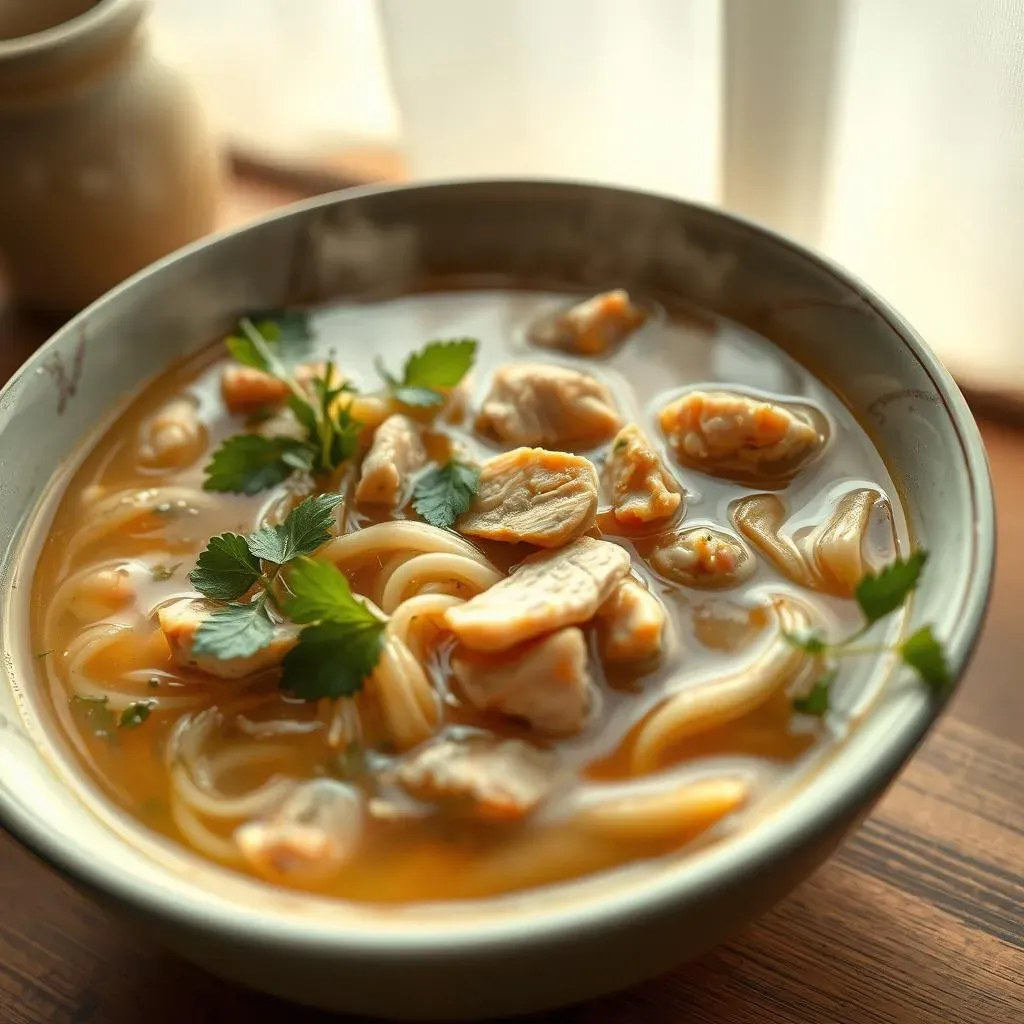Table of Contents
That scratchy, painful throat – we've all been there. When a sore throat strikes, finding relief quickly becomes top priority. While modern medicine offers solutions, many turn to a time-tested remedy: chicken noodle soup for sore throat. But is it just an old wives' tale, or is there real science behind this comforting classic? This article explores the surprising effectiveness of chicken noodle soup in soothing sore throats. We'll dive into the scientific reasons why this simple soup works its magic, examining its properties and how they combat throat irritation. Then, we'll equip you with delicious and easy-to-follow recipes, ensuring you can whip up the perfect batch of healing chicken noodle soup for sore throat. Get ready to discover the comforting power of this age-old remedy and learn how to make it your go-to solution for those achy throat days!
Chicken Noodle Soup for Sore Throat: Does it Really Work?

Chicken Noodle Soup for Sore Throat: Does it Really Work?
So, you're wondering if chicken noodle soup really helps with a sore throat? It's a question that's plagued humanity for generations! Grandma swore by it, and while there's no magic cure, science actually backs up some of its benefits. The warm broth hydrates, which is crucial when you're battling a sore throat. Dehydration can make the discomfort even worse, so staying properly hydrated is key. The steam from the hot soup can also soothe irritated tissues. Think of it like a mini, edible steam inhaler! Plus, the soup itself is usually packed with nutrients, like vitamins and minerals, that your body needs to fight off illness. It's not a miracle cure, but it certainly helps ease symptoms.
Benefit | Explanation |
|---|---|
Hydration | Warm broth replaces lost fluids. |
Steam Inhalation | The steam from the soup moistens and soothes the throat. |
Nutrient Boost | Vitamins and minerals support the immune system. |
Now, let's be clear: chicken noodle soup won't magically vanish your sore throat overnight. It's not a replacement for medical advice or treatment. If your sore throat is severe, lasts longer than a week, or is accompanied by other symptoms like a high fever, you should see a doctor. Think of chicken noodle soup as a supportive friend, offering comfort and hydration while your body fights off the infection. It’s a little bit of TLC in a bowl. But even if it doesn't completely cure your sore throat, the warm, comforting feeling it provides is undeniably beneficial, right?
- Drink plenty of fluids alongside your soup.
- Rest is crucial for recovery.
- Consider over-the-counter pain relievers if needed.
The Science Behind the Soup: Why Chicken Noodle Soup Soothes Sore Throats

The Science Behind the Soup: Why Chicken Noodle Soup Soothes Sore Throats
Hydration is Key
Let's talk hydration! A sore throat often comes with dehydration. Think about it: when you're sick, you might not be drinking as much as usual. This leads to dry, irritated tissues in your throat, making the discomfort even worse. The warm broth in chicken noodle soup acts as a fantastic way to replenish those lost fluids. It's gentle on the stomach, easy to sip, and gets those vital fluids back into your system quickly.
The salt content in the broth also plays a role. It helps your body absorb fluids more efficiently. It's a subtle but significant factor in easing that scratchy throat feeling. Think of it as a tiny bit of extra help for your body to stay hydrated.
Hydration Method | Benefits |
|---|---|
Drinking plain water | Essential, but can be less appealing when sick. |
Chicken noodle soup broth | Hydrating, flavorful, and easy on the stomach. |
The Magic of Steam
Beyond hydration, the steam rising from a hot bowl of chicken noodle soup provides a surprising benefit. As you inhale the steam, it acts like a natural humidifier for your throat and nasal passages. This added moisture helps to loosen mucus and soothe irritated tissues. It's like a mini, at-home steam treatment, built right into your meal.
This gentle steam helps to reduce inflammation and swelling in the throat, making swallowing a little bit less painful. It also helps to keep the throat moist, preventing further irritation from dryness. It's a simple, yet effective, way to add some extra relief to your sore throat.
- Inhaling steam from a bowl of hot water (add essential oils like eucalyptus for extra relief).
- Using a humidifier in your bedroom.
- Taking warm showers or baths.
Nutrient Powerhouse
Finally, let's not forget the nutritional benefits packed into a good bowl of chicken noodle soup. Chicken is a great source of protein, which is essential for tissue repair and immune function. The vegetables, whether it's carrots, celery, or onions, add vitamins and antioxidants that support your body's natural defenses against illness.
These added nutrients help boost your immune system, giving your body the extra support it needs to fight off the infection causing your sore throat. It's not a magic bullet, but it's a delicious way to give your body the nutrients it needs to heal faster. Plus, the carbohydrates in the noodles provide some easily digestible energy.
"Chicken soup may not cure a cold, but it makes you feel better while you're getting better." - Unknown
Recipes and Tips for the Perfect Chicken Noodle Soup for Sore Throats

Recipes and Tips for the Perfect Chicken Noodle Soup for Sore Throats
Recipes and Tips for the Perfect Chicken Noodle Soup for Sore Throats
Alright, let's get cooking! The beauty of chicken noodle soup is its adaptability. There's no single "perfect" recipe; it's all about personal preference and what you have on hand. However, here are some tips to ensure your soup is both delicious and soothing for a sore throat. First, start with a good quality broth. Homemade is best, but store-bought low-sodium broth works in a pinch. Don't be afraid to experiment with different types of broth – chicken, vegetable, even bone broth can add depth of flavor and extra nutrients.
When it comes to the chicken, use bone-in, skin-on pieces for extra flavor and richness. The bones release collagen into the broth, adding to its soothing properties. Let the chicken simmer gently for at least an hour to ensure it's tender and flavorful. Don't rush this process; slow cooking is key to a truly comforting bowl of soup. Once the chicken is cooked, shred it and add it back to the pot. For noodles, egg noodles are a classic choice, but you can experiment with other shapes and sizes. Just remember that smaller noodles are often easier to swallow when your throat is sore.
Ingredient | Tip |
|---|---|
Broth | Use low-sodium broth or make your own for better control over salt content. |
Chicken | Bone-in, skin-on chicken adds more flavor and collagen. |
Vegetables | Soft vegetables like carrots, celery, and onions are easiest to eat. |
Noodles | Smaller noodles are easier to swallow when your throat is sore. |
Adding vegetables is a great way to boost the nutritional content of your soup. Soft vegetables like carrots, celery, and onions are easy to eat, even when your throat is sore. Consider adding herbs and spices like ginger or garlic for an extra boost of flavor and immune-supporting properties. A pinch of salt can help soothe the throat, but keep it moderate to avoid adding extra irritation. A squeeze of lemon juice at the end adds a touch of brightness and vitamin C, too!
Finally, don't forget the importance of presentation. A warm, comforting bowl of soup is more than just a meal; it's an act of self-care. Take your time to create a beautiful bowl of soup – it'll make the experience even more enjoyable and therapeutic. Serve it with a side of crusty bread for dipping, if you like. And remember, this is your recipe; feel free to adapt it to your preferences and what you have available. The most important thing is to create a comforting and flavorful soup that helps you feel better.
- Experiment with different herbs and spices (ginger, garlic, thyme).
- Add a squeeze of lemon juice for vitamin C and brightness.
- Serve with crusty bread for dipping (if your throat allows!).
- Garnish with fresh herbs for an appealing touch.
